Dakota Johnson, Jon Hamm, Jeff Bridges and others talk of their ‘Bad Times at the El Royale’ experience
Los Angeles — We recently met with the cast of Drew Goddard’s thriller, “Bad Times at the El Royale,” where seven strangers who are each hiding secrets meet one night in a shady novelty hotel at the border of California and Nevada.
Set in 1969, the film features Jeff Bridges (as Daniel Flynn, an aging criminal masquerading as a priest), Jon Hamm (as Seymour “Laramie” Sullivan, a vacuum cleaner salesman), Dakota Johnson (as Emily Summerspring, a Southern criminal), and Cynthia Erivo (as Darlene Sweet, a struggling singer).
Below are excerpts of our interviews with the cast and the director:
Dakota Johnson
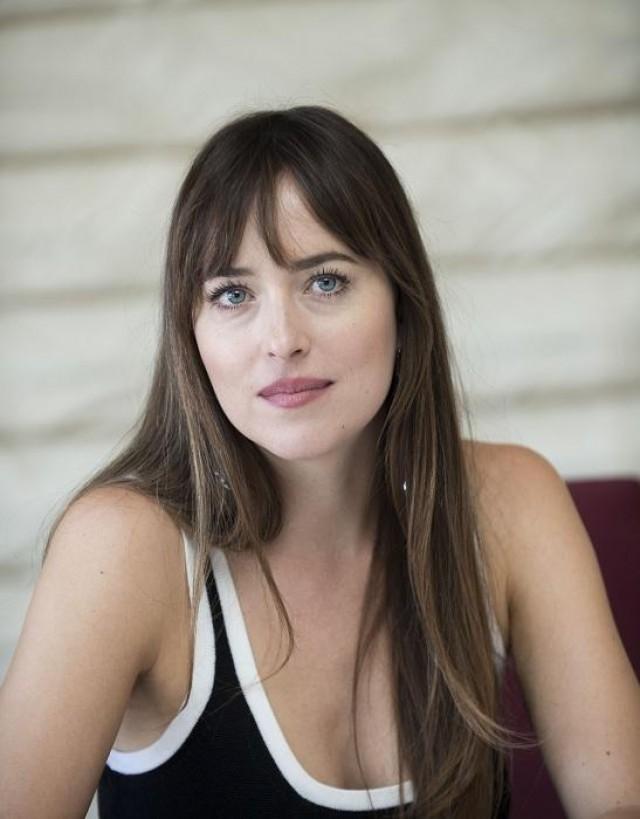
On how much fun she had creating her Southern criminal character:
It was so fun. I haven’t played a character with such swagger, so it was really, really fun to do that. It was really fun to be very angry and really fun to play a woman who is not sorry for being angry and has really struggled and experienced a lot of terrible things. She has been broken and damaged and won’t have it any more.
I respect her and I had a lot of fun [playing her], in the wardrobe because it was very empowering, it was very strong. I had eight pairs of these jeans that they made to my body and they were so tight that I had to lay down and have two people zip them up. It was hardcore. Then they’d stretch out, and so I’d wear one pair for two days working and then they’d put me back in a tighter pair.
On the music of the late ‘60s:
It’s a huge part of my life and I have a purely emotional relationship with music. I’m not musically inclined. I can play a little bit of piano but I don’t make my own music.
So, it’s a completely different experience for me, music as opposed to films. Because when I watch films I’m studying and dissecting and looking at everything and seeing how they did it but when I listen to music, I just disappear into it, and that’s the most, I think that’s what draws me to movies that are very audio-centric, sort of.
When the story unfolds around music and when the music is very informative of what happens and when the musical cues are huge parts of the story, I just love it so much. It means so much to me and this one, specifically, because it’s such an amazing genre. Like, the music that comes out of the 60’s and 70’s is my favorite. That’s when I really started to get into loving music.
On doing horror films:
I just ended up doing a bunch of darker, more intense kind of scary movies. I guess. I was drawn to women who aren’t really what they seem. Or who experience something very profound and come out the other side a different person. So, that’s the common thread that I found in these last few films I’ve done. I’m not sure what’s going to happen next. I would like to do something funny soon, but I’m not sure what’s up.
Jon Hamm
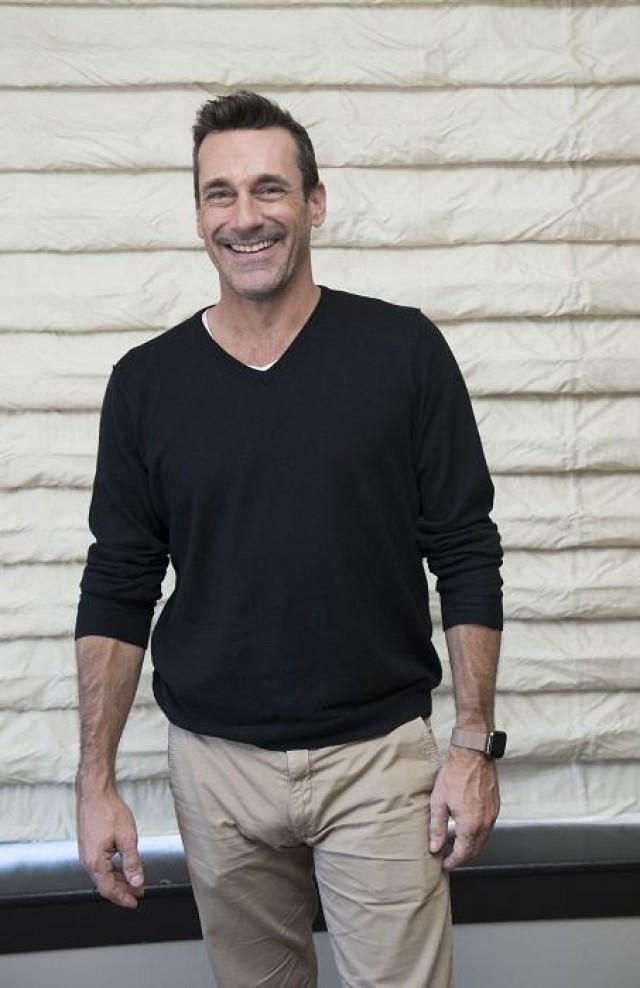
On doing a project set in the ‘60s again:
First of all, I was pleased to go back to the era because I really like it. Artistically, musically, culturally, everything about it, there’s a reason that “Mad Men” resonated the way it did, because those ten years that we played over the show were some of the most interesting, difficult, challenging, exciting years of American history.
That said, midtown Manhattan in 1960 is wildly different from Lake Tahoe in 1969. These are the times that we are dealing with: Nixon and Manson and assassinations and the beginnings of Watergate and the middle of Vietnam.
So all of these institutions are really starting to teeter and crumble. The idea of secrets, lies, surveillance and all of this stuff, we know now was really happening and is probably still happening. So it’s a really ripe world, a rich world to set this in. I was very happy to go back.
On his good and bad times at a hotel:
I have never really had bad times like this in a hotel, fortunately. I have certainly had some weird times, where people have walked into my room, like a key somehow got flipped around or something and I would be sitting at the computer or something, thankfully not doing anything else, (laughter) and someone would walk in the room and you are kind of like uh, hello, hi?
And you are mortified and embarrassed but you are kind of just like okay, well turn around and change your key out, that’s weird. Or the lady will give the wrong key to the wrong person, whatever. That’s probably the weirdest thing that I have had happen to me.
But a good time, usually it’s being around friends, doing something interesting, I had a great time the other night, a friend of mine took me to a concert at the Greek Theatre, and we were able to walk there and walk home and that’s nice, that’s why I love living in California, you can be outside all the time. It doesn’t take much.
On how he gets comfortable in a place:
It depends on how long I am there. If I am staying in a hotel, a little debilitating maybe after the second week, really after the first week, and you have gone through all the things on the room service menu and you are starting to become very familiar with the hotel staff and it just feels a little odd.
I like having a kitchen. I like making my own coffee in the morning and I like doing laundry and all that stuff is very nice. So for example on “Baby Driver,” I lived in an apartment down in Atlanta for seven weeks or however long we were down there. So that was really nice. And you make it your own and you buy a candle and the little portable speaker and whatever. You can go grocery shopping and do all that and that part is nice.
Hotels are designed to be transitory spaces. If you find yourself in a hotel for too long, something’s probably gone bad in your life. (laughter) It’s never a great idea and it’s also wildly expensive. So I don’t love hotels for longer than a few days.
On the use of silence in acting:
There’s a sequence in the film that’s about seven minutes long that is done in one uninterrupted take. For something like that to be pulled off, everyone has to be working in concert. It’s not just me and the guy driving the dolly and the camera guy that’s doing the pan and tilt. It’s people that you will never see, because their job is to bring big black flags and block reflections. So it’s this bizarre kind of 12-person dance. You only see this much of it.
Then there’s a secondary level where there’s parts of that scene where the camera sees certain things that my character doesn’t see because I have moved onto the next thing, but the camera is lingering. So there is this kind of dance that happens because the camera has to anticipate moves, you want to give them some kind of clue, preferably off camera that you are about to go, so usually you will tap your foot or something, so that the camera can start and you can start. It took us 20 odd something takes to get that. The camera hits a bump, the dolly has a flat tire, whatever happens, happens. It’s six minutes at a time, seven minutes at a time and it was just a fun day, I will tell you that much.
On how good a salesman he can be:
Yeah, Danny Glicker had a great time designing Laramie’s stuff, because he would very distinctly design for Laramie and for Dwight. And there were two different guys in his mind, which there were, I mean he is playing a character, he is wearing a costume.
I think that flamboyancy and that kind of garishness is on purpose and he is like, look at this hand, don’t look at what this hand is doing. And Drew did that on purpose, he worked that into the script and it’s a wildly, wildly intelligent script. I was telling someone else, it’s smarter than it needs to be. You can just lean on the genre if you really wanted to. But instead, he wrote some really incredible passages into it and imbued it with the creativity that is really quite special.
On how good he can sell himself:
I am better than I used to be. I remember having a conversation very early on in my career in Los Angeles and I had been auditioning for a lot of things, but I hadn’t been getting the part.
And I am from the Midwest and I am very naturally sort of self-deprecatory and I was talking with this very powerful agent. She said, why don’t you try selling yourself a little bit? I was like well no, that’s not what I do and she goes, that’s what we do here. So she basically was like lean in. The nickel kind of dropped and I was like oh, right, if not me, then who?
So you do learn that lesson at some point. There’s more elegant ways to do it, some people are a little brasher in their self-promotion, and I don’t like to think that I am particularly brash. But it’s also nice when you have certain organizations that get behind your work and give you a little bit more credibility in that world as well. So that is my long-winded way of saying again thank you for your guys’ support. But yeah, I am pretty good.
Jeff Bridges
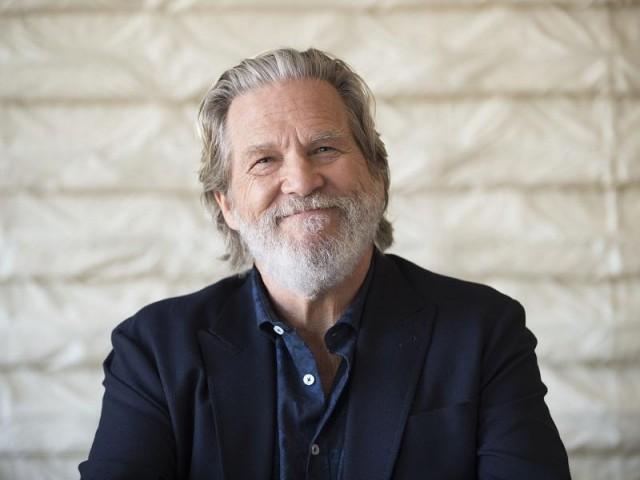
On how he met his wife Sue:
She was working her way through college in a little, a place called Chico Hot Springs in Montana and I was shooting a movie there. I couldn’t take my eyes off this beautiful girl with two black eyes. I asked her out and she said no. We bought a ranch in that same valley where we met and we will go by and recreate that moment where we met. I asked her out and she said no. It used to drive our girls crazy, like no! But now they get a kick out of that. (laughter)
On what he loved about the ‘60s:
I graduated high school in 1967, the Summer of Love. This movie takes place in 1969, which was sort of the end of all that flower power, it kind of went to seed. So that era is very dear to my heart, and I love the music that Drew chose.
The visuals, Martin Whist, the production designer, gave us a great set to work in. And Danny Glicker the costume designer, when you put on those clothes and you start to see other people in those clothes and you hear that music, it gets you in that time zone. So it was all helpful and I thought Seamus McGarvey, the cinematographer, did a beautiful job.
On inserting his own persona into his characters:
Well that is where I start with all the characters I play and I think what aspects of myself I might amplify and what other aspects I might just kick to the curb, depending on the character and that is where I kind of start. I may branch out to people who I know who remind me of the guy and I’ll watch on the news and I find the character when I am preparing for a role. I am like a sponge. I take everything in. I might see how you are standing and I’ll be like oh yeah, that’s how the guy could stand. Stuff like that.
This is no place for a priest. Bad Times at the El Royale, in theaters October 12. #ElRoyaleMovie
A post shared by Bad Times at the El Royale (@elroyalemovie) on
On his efforts to help children and prevent hunger:
I have been the national spokesperson for an organization called “Share our Strength” and their no kid hungry campaign for about, it’s going on four, five years, something like that.
We are concentrating on ending childhood hunger here in America and we currently have one in six kids struggling with hunger here in America. About the same time that I became the national spokesperson, I shifted my attention rather than dealing with the Federal Government, to dealing with the local State Government and that has been very gratifying to find out that a lot of Governors didn’t know that there’s over a billion dollars of federal funding that’s available to ending childhood hunger in their states with proven means. But a lot of these governors don’t know about that money and it’s just sitting on the table and if they don’t have programs in place then that money is used elsewhere. So we have been concentrating on that and also summer meal programs for the kids.
On what’s next for him:
I am going to do a little music. I got some new tunes to work out. My friend Chris Valonus has a club in Solvang above Santa Barbara there, so go to do some music, that’s the next thing.
Cynthia Erivo
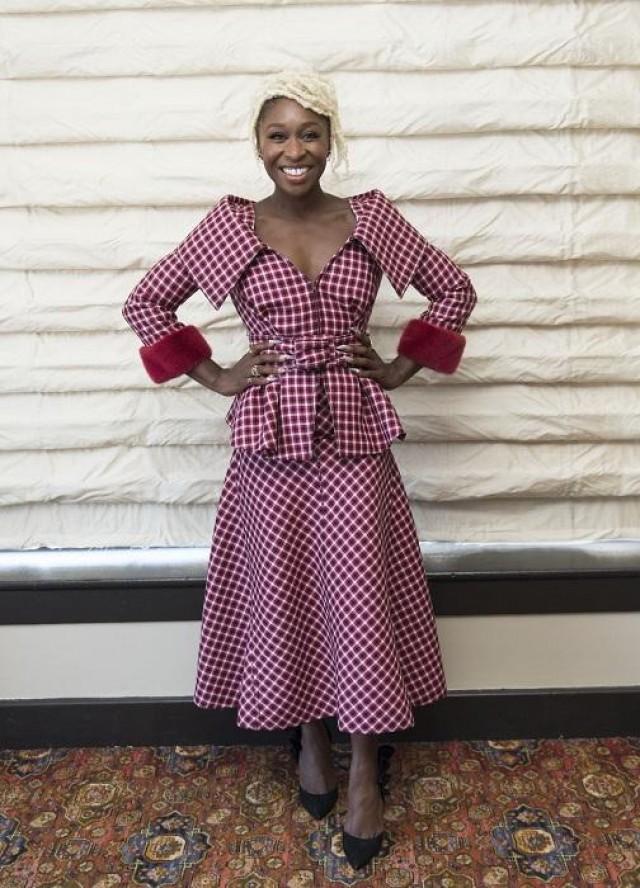
On the music of the ‘60s:
I was quite familiar with all of them. It's so strange because when I had the list of songs that I was going to sing, there were a couple of titles that I didn't know, but when I heard the songs, I knew them. So it was like knowing the songs but not realizing that I did. It's sort of, I guess by osmosis, my mother playing them or listening to them together that I had learned them by accident almost. I think the song that I found the hardest to learn was probably, “Hold on I’m Coming” which is the last song in the film, which I do. And that was probably surprising just because I've never done that before. So I didn't know that I knew it to sing it, but it was fun to sing. Definitely fun.
On her experience about being on the set:
Because it's new to me, because I'm more used to being on stage with a live audience and usually you get the audience that comes at you and they tell you what they need. I feel like you get immediate reaction and that immediate reaction from a live audience is an indication of what they need, what they want.
On film you're sort of only able to be guided by who is around, your cast members, your director. And so you have to learn to exercise patience with yourself and with the process and to trust that eventually, you'll have something that people want to see. And then luckily, for the first time I saw it last night, to be in the room when people were watching and you see them reacting, that was special. And so you realized then ok, I think we've given something that they want, which is kind of cool.
On her experience working with director Drew Goddard:
So whilst I was on the set of "Widows", I get a call to say they are interested in me for this particular role. So I put myself on tape, like the newbies do, like you do when you first start out, put yourself on tape. You send the tape in and they asked me to put myself on tape again with a few different directions. And then they called me to come in to do a workshop with Drew. And I think it was about an hour and a half. We sat and he was just so generous and excited and kind and worked through the scenes, worked through songs, talked about the character. And I left the room thinking, even if I don't get this role, I know that I've had a really good time today and I felt really great about it when I left the room. And then a couple of weeks later found out that I was playing the role, which was amazing.
On wearing wigs:
As a woman of color, I like to mess around with different styles, but I also wear my hair natural most of the time. And so when Drew, because he knew that he wanted at some point in the film for her to take off that wig because it felt like it was a moment for her to almost reveal herself, to become unafraid of being vulnerable, to take away all of the walls that she may have put up.
And that was, I think, a special moment to be able to do as a woman of color because we don't see that very often. And I think that it's serves as encouragement to those women who feel they need to hide behind that, to not have to do that. And I understand that characters need certain things. So there will be times when it is necessary to wear a wig for a role, but it's also really lovely to know that that doesn't always have to happen.
Drew Goddard, director
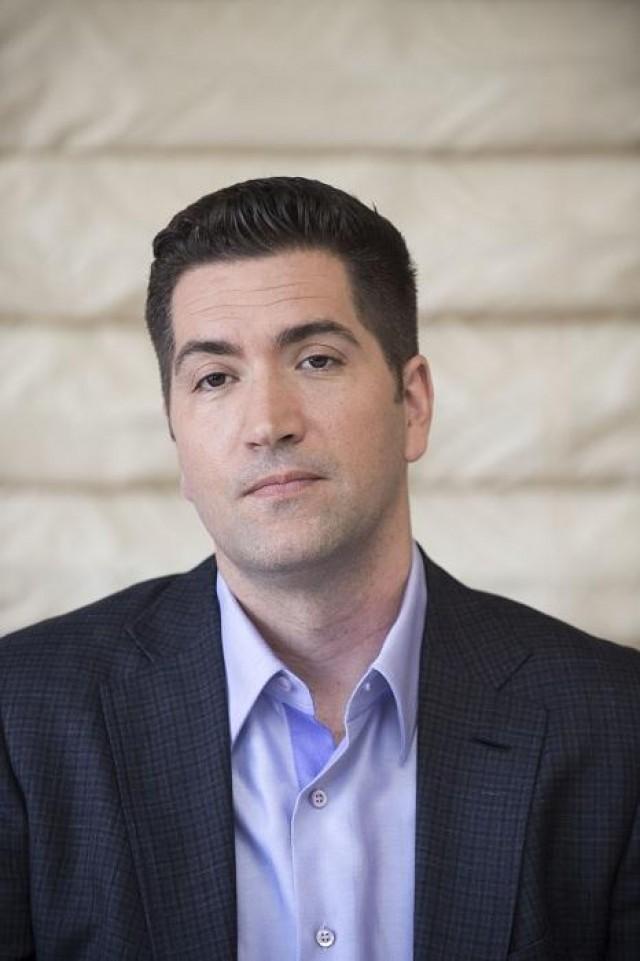
On the idea of having it in a hotel:
I had the idea early. I love hotels and then you start to think about well, I got to build this thing. How do I keep it interesting and how do I keep it interesting thematically for myself and when I looked at the characters I realized so much of this movie is about duality.
It's about who you appear to be versus who you are. It's about who your reflection is versus who you are and I realize like oh, it sort of happened organically. It would be great if we could split the hotel down the middle as well and sort of feel the two sides of the place.
On his inspirations for the film:
There was a bunch “Out of the Past” I looked at a lot. I looked at “The Conversation” came up a lot. Hitchcock it was probably “Vertigo” and “Rear Window” obviously. One of the things that was amazing Onabout “Rear Window” is how long he held the camera on those windows. When you go back and watch it again, you realize like he holds, he lets you watch for an uncomfortably long time and it has this effect of making you, the audience member, into a voyeur. It actually if you start cutting it up it starts to feel like you lose the voyeurism so that was very much on my mind when we were doing the long tracking shot. I wanted to feel, evoke the same thing that Hitchcock evoked in me.
On what God means to him:
It's funny because I was raised very Catholic. I was raised very Catholic and I didn't – I sort of went through a period where I would imagine a lot of people go through where I sort of was told the doctrine of the church and then around my teenage years I realized, I rebelled and said I don't believe any of this and then as I got a little older I started to understand the need for spirituality and why that is important and so it sort of evolved.
I think the movie reflects that, the idea that there are people that will exploit religion for their own benefits and if you look at the characters a lot of the people in this movie are exploiting the idea of religion and yet at the same time there's a real reason that we need spirituality and I felt like those two things were very much the core of this movie, the people that exploit our need for morality in order to our morality and the need to find that within ourselves and the movie is very much about that battle.
On the casting:
Look, the best part of being a writer-director is that you get to just cast whoever you want and it's so much fun be because you just sort of come up with your dream cast and certainly for this one I wanted to do an ensemble movie but you don't really see ensembles anymore unless there's a bunch of superheroes in them.
You just don't get a chance to do that and so I sort of set out to say let's just see, let's see what happens when you get your favorite actors and just put them in a room and let them start throwing body blows at each other. Let's just see. Let's just start there and let the movie take over so honestly like, again, a lot of its naiveté. I just sit down with a list and go well, if I could have anyone in this movie it would be Jeff Bridges. If I could have any person on the planet it would be Jeff Bridges and then you go well, let's see if he'll do it. It doesn't hurt to ask, right. Send him the script. You never want to self-edit and he said yes right away and once Jeff says yes it really starts there's a gravitational pull about him that sort of starts bringing everyone onboard. — LA, GMA News



